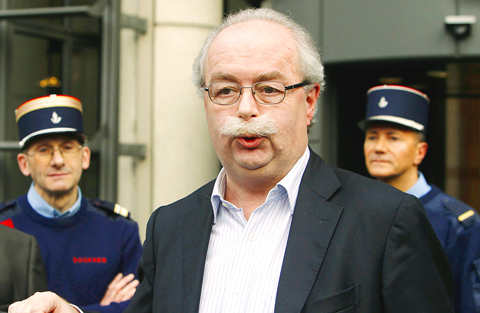A French labor union walked out of talks with oil giant Total on Sunday, pledging to toughen a strike that has shut down the company’s refineries in France for three days.
Charles Foulard, the CGT union’s coordinator for Total, left talks at the company’s headquarters west of Paris saying “negotiations have broken down.”
CGT, which represents a majority of workers in the conflict, wants to enlist workers at French refineries not run by Total SA in the protest, he said.

PHOTO: AFP
The strike has shut down Total’s six French refineries — half the total in France — since Friday. The movement, sparked by workers’ concerns about the future of a refinery in Dunkirk, northern France, has raised fears in France about possible gasoline shortages.
Total says it has fuel stored that it can draw on, though it has declined to say how many days that could last. It also says it can make stocks from other European countries available if needed.
The oil giant has been preparing new uses for the Dunkirk site and the company says its activities have been stopped since September because of a drop in consumption of petroleum products.
French Industry Minister Christian Estrosi said that Total’s chief executive promised him on Sunday that all Dunkirk workers’ jobs were guaranteed, whatever was decided about how to use the site in the future, but the CGT has insisted that the refinery must continue to run as it has in the past.
CGT meetings to discuss the strike’s future were planned at Total refineries yesterday.
Foulard has predicted France will reach “borderline shortage” in the coming week. The French oil refiners’ body, UFIP, said this weekend that France has at least 10 days’ worth of fuel stocks.

MORE VISITORS: The Tourism Administration said that it is seeing positive prospects in its efforts to expand the tourism market in North America and Europe Taiwan has been ranked as the cheapest place in the world to travel to this year, based on a list recommended by NerdWallet. The San Francisco-based personal finance company said that Taiwan topped the list of 16 nations it chose for budget travelers because US tourists do not need visas and travelers can easily have a good meal for less than US$10. A bus ride in Taipei costs just under US$0.50, while subway rides start at US$0.60, the firm said, adding that public transportation in Taiwan is easy to navigate. The firm also called Taiwan a “food lover’s paradise,” citing inexpensive breakfast stalls

TRADE: A mandatory declaration of origin for manufactured goods bound for the US is to take effect on May 7 to block China from exploiting Taiwan’s trade channels All products manufactured in Taiwan and exported to the US must include a signed declaration of origin starting on May 7, the Bureau of Foreign Trade announced yesterday. US President Donald Trump on April 2 imposed a 32 percent tariff on imports from Taiwan, but one week later announced a 90-day pause on its implementation. However, a universal 10 percent tariff was immediately applied to most imports from around the world. On April 12, the Trump administration further exempted computers, smartphones and semiconductors from the new tariffs. In response, President William Lai’s (賴清德) administration has introduced a series of countermeasures to support affected

CROSS-STRAIT: The vast majority of Taiwanese support maintaining the ‘status quo,’ while concern is rising about Beijing’s influence operations More than eight out of 10 Taiwanese reject Beijing’s “one country, two systems” framework for cross-strait relations, according to a survey released by the Mainland Affairs Council (MAC) on Thursday. The MAC’s latest quarterly survey found that 84.4 percent of respondents opposed Beijing’s “one country, two systems” formula for handling cross-strait relations — a figure consistent with past polling. Over the past three years, opposition to the framework has remained high, ranging from a low of 83.6 percent in April 2023 to a peak of 89.6 percent in April last year. In the most recent poll, 82.5 percent also rejected China’s

PLUGGING HOLES: The amendments would bring the legislation in line with systems found in other countries such as Japan and the US, Legislator Chen Kuan-ting said Democratic Progressive Party (DPP) Legislator Chen Kuan-ting (陳冠廷) has proposed amending national security legislation amid a spate of espionage cases. Potential gaps in security vetting procedures for personnel with access to sensitive information prompted him to propose the amendments, which would introduce changes to Article 14 of the Classified National Security Information Protection Act (國家機密保護法), Chen said yesterday. The proposal, which aims to enhance interagency vetting procedures and reduce the risk of classified information leaks, would establish a comprehensive security clearance system in Taiwan, he said. The amendment would require character and loyalty checks for civil servants and intelligence personnel prior to